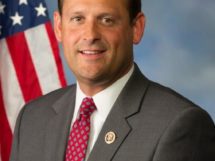COVINGTON, Ky. (June 8, 2017) – The mainframe computer processing all of Kentucky’s unemployment insurance claims was built a decade before the 1980s-era arcade game Pac-Man.
“Think about that,” Deputy Secretary for Education and Workforce Development Cabinet Brad Montell said while testifying before the Interim Joint Committee on Appropriations and Revenue yesterday at the Northern Kentucky Convention Center. “This thing is old. It’s slow. It’s not employer friendly at all. It runs from 7 a.m. to 7 p.m. and then it is done. It’s got to rest. It’s got to have time to think. And it will only run five-and-a-half days a week. We got to shut her down for the weekend – literally.”
Montell, who served seven terms in the state House before joining the executive branch in October, proposed upgrading the 1973 technology with a percentage of the employer contribution to the unemployment insurance trust fund. While he didn’t say what percentage would be redirected, the minimum amount needed to update the technology is estimated at $35 million.
After the Great Recession plunged the trust fund into nearly $1 billion in debt by January 2012, its coffers have since been replenished. The fund had a positive cash balance of $425.2 million as of June 1. Montell said federal authorities have advised his cabinet that the state needs about $800 million in positive cash flow for a healthy fund.
“Good things happen when our trust fund is healthy,” he said. “We are reaping the benefits of those good things.”
Benefits have increased while employer contributions continue to fall, Montell said. The next reduction for employer contributions is forecasted to take effect in January.
In addition to upgrading the 44-year-old mainframe, Montell said the state Office of Vocational Rehabilitation needs an additional $3.8 million in state tax dollars in order to receive the total amount of federal matching money earmarked for the state. Montell said Kentucky is losing about $10 million in federal tax dollars because the state doesn’t fully fund its vocational rehabilitation office. He said the lack of money means the office tasked with finding jobs for all Kentuckians with disabilities can only assist persons with the most severe disabilities.
“That is really a shame,” Montell said in reference to Kentuckians with disabilities who are turned away.
After hearing Montell’s testimony, committee Co-chair Christian McDaniel had a warning for state cabinets and advocates of various causes: Any additional tax dollars for capital projects should create enough savings within the budgeting cycle to pay for itself.
“The fact is, absent tax and pension reform, we can expect a double-digit cut in every sector of government,” said McDaniel, R-Taylor Mill. “The pension system has simply gotten into too bad of a state – been neglected far too long. When pension and Medicaid in a decade go from 18 percent to 38 percent of the commonwealth’s budget it’s got to come from somewhere.”
He said justice, social service and education advocates all have an interest in keeping the state pension systems solvent.
“You have skin in the pension game,” McDaniel said. “You’ve had it for a long time, but now a lot of long-term problems have to have very near-term solutions. It is going to be some tight budgeting times.”
In other business, Cabinet for Economic Development Deputy Commissioner John Bevington also testified at yesterday’s meeting that his cabinet hopes to entice more businesses to expand and locate in Kentucky to increase the tax base and ease the budget constraints.
Businesses have announced $5.8 billion in new investment forecasted to create more than 9,500 jobs so far this year, he said. The largest of those investments is $1.3 billion to upgrade and retool of Toyota Motor’s assembly plant in Georgetown, $1.5 billion to locate Amazon’s air freight hub to Cincinnati/Northern Kentucky International Airport in Hebron and $1.3 billion for Braidy Industries to build an aluminum rolling mill in Greenup County.
“We want to surpass the highest level of announced capital investment in the state’s history and announce more than 17,000 new jobs, “Bevington said of his cabinet’s goals. “We want to move the commonwealth into the top quartile of business-friendly state rankings.”




















Add Comment